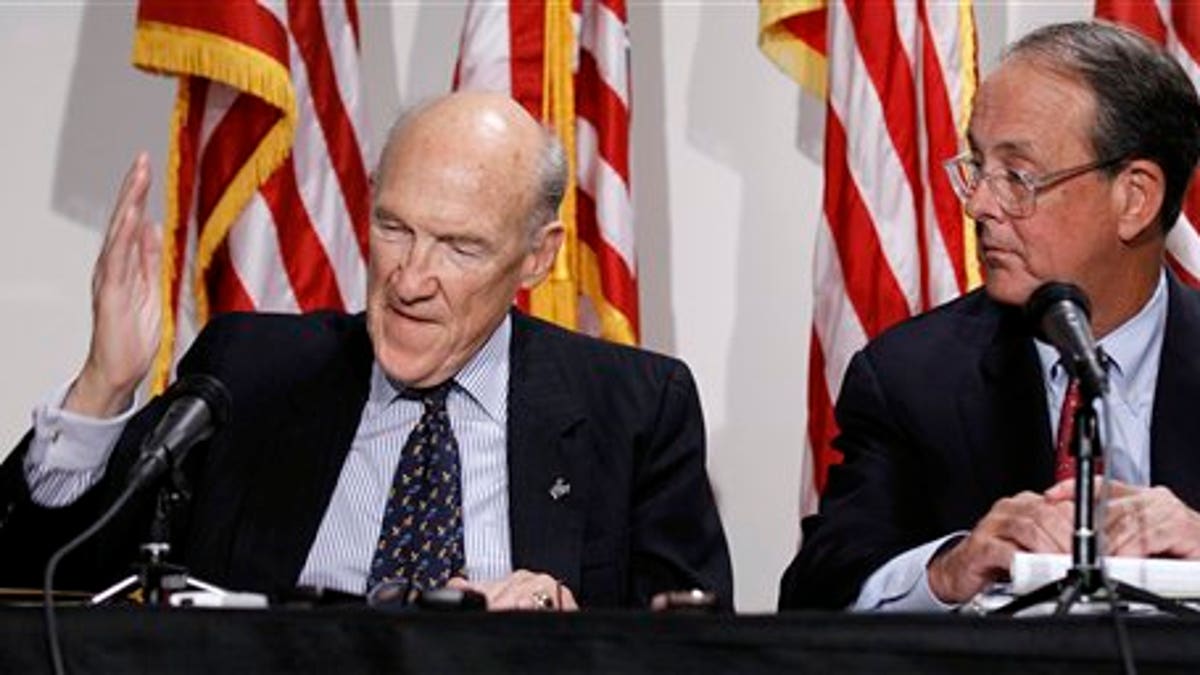
President Barack Obama's Debt Commission co-chairmen, Erskine Bowles right, and former Wyoming Sen. Alan Simpson, take part in a news conference on Capitol Hill in Washington Tuesday, Nov. 30, 2010. (AP Photo/Alex Brandon) (AP2010)
Erskine Bowles and former Senator Alan Simpson offered some revisions to their sweeping plan to reduce deficits by 4 trillion dollars over the next nine years.
And they got support from members of both parties worried about our future.
Republican Senator Judd Gregg said if our borrowing "continues on this course, prosperity for Americans will be jeopardized, and we will be the first generation in the history of this country to pass a less prosperous and secure nation on to our children."
And Democratic Senator Kent Conrad said, "I am prepared to support this plan and to support it strongly because I don't see another alternative."
Only one person, Democratic Representative Jan Schakowsky of Illinois, said she will vote no.
In all, seven commissioners were supportive. Even those with reservations want to keep the plan alive.
House Democrat John Spratt of South Carolina says, "If it fails, I don't think we'll revisit it for some time to come. I think it's extremely important that we continue the process."
Even those with different views about how to deal with deficits are concerned about the mess the nation is in.
Commission co-chair Erskine Bowles says, "The problem is real, the solutions are all painful, and there's no easy way out."
Solutions such as freezing domestic and defense spending for years. And eliminating 1.1 trillion in annual tax deductions, including the mortgage interest deduction. The co-chairs noted that some could be added back -- if commissioners indicate how they'd be paid for.
Some of the savings would be used to lower all tax rates, leaving them as low as 8 percent and the highest at 23 percent.
As far as the pain is concerned, the always colorful Simpson emphasizes that we cannot keep borrowing so much.
"This is it," he says. "No more fun and games, smoke and mirrors, alchemy, trickery, cunning, CYA demagoguery, and making promises we can't possibly keep."
Promises such as Medicare, which is part of $88 trillion dollars in promised future benefits that we cannot pay for.
The new plan would reduce future costs, in part by making the wealthy pay more.
The plan would also repair Social Security to avoid a scheduled 22 percent cut in benefits, in part by making the wealthy pay more and get less, and in part by gradually raising the retirement age. One Democratic leader went against the grain in his party on that issue: Senator Richard Durbin, a member of the leadership.
"I'm going to say something now which is heretical on the left. And they won't like me for saying it," said Durbin, "but what you have suggested in increasing the Social Security retirement age is acceptable to me. To raise it one year over 40 years is hardly radical."
An up or down vote is now scheduled on the commission plan on Friday.
Former Senator Simpson warned that interest groups were poised like "denizens of the darkness," as he put it, "to rip this baby to shreds." But he urged commissioners to make their own decisions on the plan.
And Erskine Bowles says, "We believe it will keep our nation from falling into the abyss."
More and more Americans are worried about that, and the commission's plan -- as controversial as it is -- aims to do everything it can to find a way to prevent that.




